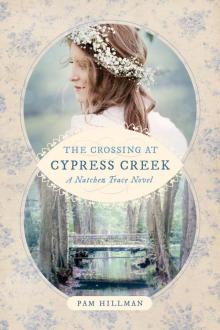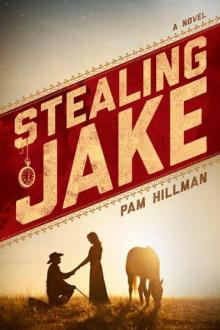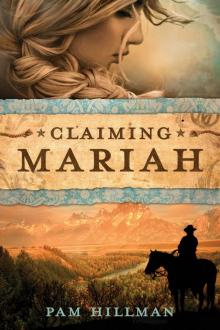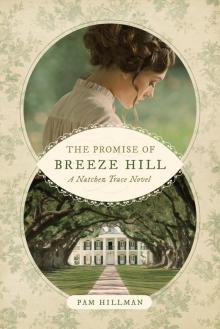- Home
- Pam Hillman
The Crossing at Cypress Creek Page 6
The Crossing at Cypress Creek Read online
Page 6
Uncle Jude had been right to worry, to insist they wear rags and steer clear of the landing any time the river pirates came ashore.
And then Betsy had put herself in danger once again. She cupped her sister’s face. “Betsy, promise me you’ll stay close to home. Those men back there. They could have hurt you like —like Micaiah did. Do you understand?”
Betsy nodded, one small jerk of acknowledgment.
Alanah searched her sister’s face. Had her warning sunk in, or had Betsy pushed all memory of the past few months into a deep, dark hole for her own sanity?
“All right. Let’s go.”
They stumbled down an embankment, and Betsy slid into a heap at the base of a tree.
“I’m tired, Alanah.”
“We’ll rest for a moment.” Alanah sat and Betsy rested her head against her shoulder. Within seconds, her breathing slowed, and she dozed. Alanah took a deep breath and let it out in a long sigh.
How her sister had managed to walk all the way to the logging camp in her weakened state was a mystery. She’d let her sleep for a moment; then hopefully Betsy would be able to make it the rest of the way home.
After a few minutes, as long as she dared wait, she nudged her sister. “Betsy. We need to go. It’ll be dark soon.”
But her sister didn’t stir.
“Betsy —”
A noise to her right had her nocking an arrow and swinging her bow up. She froze when she saw Caleb O’Shea and the huge dark-skinned man with the hoop earring. After a moment’s hesitation, she centered the arrow on the big man. She’d shoot him first, then deal with O’Shea.
The men stopped at a respectable distance, the Irishman motioning to her sister. “I was afraid the lass could no’ travel far.”
Alanah found her voice. “So you followed us?”
“Aye.” His black eyes shifted back to hers. “We mean you no harm. But we would see you home before nightfall if you’ll allow.”
The offer seemed sincere, but Alanah had been around scoundrels of one sort or another all her life. Most weren’t as smooth-talking as the Irishman named Caleb O’Shea, and most didn’t politely ask to help. No, like Micaiah, they took what they wanted and discarded the rest.
Her gaze ricocheted between her sister, Caleb, and the broad-shouldered man who stood half a head taller than any man she’d ever seen. Could she trust them? These men and the ones back at the logging camp had been given ample opportunity to do with them as they wished, and they hadn’t. Instead, the man in charge had given her the bacon that Betsy had tried to steal and sent them on their way.
Caleb motioned to him. “Tiberius won’t hurt ya none, lass. He’ll do as I tell ’im.”
The African’s broad nose flared, and he glared at Caleb. Then his gaze met Alanah’s, and he all but rolled his eyes. The comical gesture swayed her in ways that the Irishman’s words never could.
Alanah released the tension on her bow. “I’d be obliged.”
Caleb moved aside, and the man called Tiberius lifted her sister in his arms as if she weighed no more than a newborn piglet.
“Lead the way, lass.”
As she plowed into the woods toward home, Caleb O’Shea by her side, the large, silent man carrying her sister, she prayed she hadn’t made a mistake in accepting their charity.
Caleb couldn’t believe the frail woman in Tiberius’s arms had walked as far as she had, or that Alanah knew her way through the tangled wilderness as well as she did.
She skirted around a swamp, the game trail she followed almost nonexistent. He was surprised when she veered off the trail and struck out through the forest. But all became clear when woods gave way to a wilderness road.
Caleb eyed the road, not much more than a trail, but the faint ruts showed a few wagons had made the journey. “Is this the road that goes to Mount Locust?”
“Yes.”
But instead of taking the road, she crossed over and plunged into the forest again. Caleb and Tiberius had no choice but to follow.
The afternoon shadows lengthened; then suddenly a clearing appeared, along with a small cluster of ramshackle buildings tucked at the base of a high bluff. Caleb took in the scene at a glance. A dogtrot cabin stood front and center. A barn and a small one-room cabin sat to the left along with an enclosure made of wattle fencing. A handful of hens pecked in the yard, and goats bleated a welcome from the enclosure. A rough-hewn table and a fire beneath a brush arbor caught his attention, and he eyed the two-room cabin again. No smoke wafted from the chimney protruding above the roofline. Whether because the fireplace was unsafe in some way or simply because it was cooler to cook outside during the summer months, he couldn’t say. The entire place was as sorry a sight as he’d seen since he’d landed in the colonies.
The same African woman he’d seen in Natchez with Alanah hurried toward them. As she neared, Caleb realized her hair was long and sleek and braided down her back. Maybe not African after all, but of mixed race, perhaps?
But she had eyes only for the young woman in Tiberius’s arms. “Betsy?”
“She’s fine, Lydia. Just worn-out.” Alanah turned back to Caleb. “This is Caleb, and —and Tiberius.”
The woman’s wary gaze met Caleb’s before flitting to Tiberius. She motioned toward the house. “Bring her.”
Without a word, Tiberius obeyed. Caleb watched them go, then turned to Alanah. “Why?”
“Why what?”
“Why do they call you Addled Alanah?”
She shrugged. “It’s who I am.”
“We both know that is no’ true.”
“Tell me, Mr. O’Shea —”
“Caleb will do.”
“Caleb, then.” Her mouth twisted into a slight frown. “Have you been to Cypress Creek yet?”
“I’m afraid I have no’ had the pleasure.”
“Go visit the tavern, become acquainted with the men who frequent the settlement, and maybe you’ll understand.”
Out of the corner of his eye, he saw Tiberius storm out of the cabin, ducking to avoid hitting the low beam at the edge of the porch. The woman called Lydia followed, leaned against a post, arms crossed, glaring at his back.
Caleb straightened. It seemed as if it was a good time for them to take their leave.
“Good day, miss.”
Chapter 6
“HERE’S YER SLOP.”
Micaiah Jones scrabbled for the wooden charger before his cellmates could get their hands on it. Using two fingers, he shoved cornmeal mush into his mouth as fast as he could, angling his body to shield the charger from the others.
“Gimme some. I beg you.” Morrill held out a trembling hand. Too weak to do more than ask, it was easy for Micaiah to push him away.
“Wait yer turn,” he growled, feeling no remorse for the man starving at his feet. Cowed, Morrill could do little more than watch him eat. A third prisoner —the guards had called him Kemper —lay curled in a ball in the corner, watching them with fevered eyes, too weak to even beg for his share of the rations. Finally his eyes closed. Maybe in death for all Micaiah knew.
When he’d eaten his fill, Micaiah dropped the charger. Morrill grabbed it, ate the remainder, and licked the wooden trencher clean.
The man in the corner never moved. No need in wasting food on him. He’d likely be dead by morning if he wasn’t already.
Micaiah wiped his mouth on his filthy sleeve, then retreated to the corner on the east side of the cell, away from the afternoon sun that beat down on the thinly thatched roof. Nary a breeze stirred, but in some ways the heat was better than the rain. The rain turned the dirt floor to a sea of mud, and there was no relief to be found, not even in the corner on the high side.
But he’d survived worse.
He dozed, rousing some time later to the sound of horses arriving at the cabin on the bluff that served as a courthouse. Forehead pressed against the rough timber, he watched a youth help a black-clad woman down from a carriage. They went inside the courthouse. More men arrived,
on horses and in wagons. Some in carriages. They all trooped inside. Micaiah eyed the horses. Given half a chance . . .
He closed his eyes, his thoughts scrambling for ways to get to those horses, even though there was no way out of the cage they called a jail.
A long time later, the chain rattled and the heavy door creaked open. “Jones.”
Micaiah only obeyed because it gave him an excuse to get out of the hovel, maybe even a chance to escape. He shuffled to the opening and ducked through, but before he could form a plan of escape, one of the guards held a pistol to his head. “Hold out your arms.”
There were three of them, all armed, all wary. He couldn’t overpower them all and come away unscathed, so he decided to bide his time. They shackled his arms and his legs and led him toward the courthouse.
Once inside, Micaiah scanned the faces of those in attendance, stopping when his gaze landed on the smooth face of a lad who hadn’t even started shaving. He shifted his attention to the woman. Dressed from head to toe in black, a veil covering her downcast face, it was impossible to tell who she was. But Micaiah knew. Knew who they both were.
The judge made eye contact with the boy, then nodded toward Micaiah. “Is this the man?”
“Yes, sir. That’s the man who killed my pa.”
“Mrs. MacKendrick?”
The veiled woman lifted her head, gave a short nod.
The judge faced Micaiah. “Micaiah Jones, you’ve been accused of the murder of one Wilson MacKendrick. How do you plead?”
“Not guilty.” Micaiah glared at his accusers.
“That’s a lie, Your Honor. He killed my pa and stole his horse and his flintlock.” The boy motioned to the gun on the judge’s desk. “That’s it right there.”
“How did you come by this gun, Mr. Jones?” The judge hefted the weapon, eyeing Micaiah.
“I bought it and the horse.” Micaiah didn’t expect the judge to believe him, but he didn’t have anything to lose by making the claim.
The judge sighed. “Mr. Jones, I knew Wilson MacKendrick for ten years or more. That mare was his pride and joy, and he would never part with this flintlock. His own pa gave it to him on his deathbed. By the order of this court, I find you guilty of murder. You are to be hanged by the neck until dead. Your sentence will be carried out two weeks from today.”
For the next several days, Alanah kept Betsy busy and close to home. In spite of her sister’s desire to lie abed, Alanah coaxed her out into the woods to gather herbs, nuts, greens. Anything to keep her occupied and bring her back to a semblance of normalcy.
They returned to find their uncle in the yard, his black frock coat dusty from travel. Lydia’s jaw was clenched tight as she scrubbed a deer hide stretched over a frame.
Uncle Jude’s gaze raked over Alanah, then moved to Betsy, his face mottled red with anger.
Alanah handed her sister the bag of greens. “Why don’t you go out back and start washing these?”
Head down, Betsy scurried away.
As soon as she disappeared, Uncle Jude faced Alanah. “What is she doing here?”
“She lives here, Uncle Jude.” The anger on her uncle’s face twisted her stomach into knots. She’d hoped —
“She is no longer welcome here.” Eyes blazing, he stabbed a finger in the direction Betsy had gone. “She disobeyed me —”
“Please, Uncle Jude, she meant no harm —”
“No harm?” he sputtered, his bushy white sideboards quivering with outrage. “She paraded herself in front of those men, intentionally bringing attention on herself.”
Alanah bit back her own spate of temper. She wanted to tell him to be reasonable. The only thing Betsy had done wrong was to put on a pretty dress. But all Uncle Jude could see was that she’d disobeyed him. He wouldn’t listen to reason, so there was no point in trying to persuade him.
“It won’t happen again. She learned her lesson.” Alanah kept her voice low and calm, even as Lydia pressed her lips together and scrubbed the deer hide harder.
“And what of Micaiah Jones?”
“He’s to be tried for murder. In French Camp.”
“I see. An eye for an eye, a tooth for a tooth.”
Alanah couldn’t argue with him. Micaiah had done some horrible things, if all the rumors were true. “All the more reason to be thankful Betsy was spared.”
“Spared? She got what she deserved, flaunting herself as she did.”
“Uncle!” Alanah gasped. “Betsy didn’t go with Micaiah willingly. He stole her away.”
“Ha!” Her uncle shook his head. “I didn’t believe that six months ago, and I don’t believe it now. That girl got what was coming to her, and I want her gone. She’s brought shame to this house.”
Alanah clutched her hands in the folds of her skirt. Shame? The only shame was that which her uncle brought every time he returned from preaching abroad, his Christian charity not extending to his own family, this false piety ringing as hollow as the empty meal barrel tucked in the pantry inside.
“Do you hear me, girl?” he bellowed. “I want her gone by morning. I won’t have the likes of her under my roof.”
“Please, Uncle, show some compassion. She has nowhere else to go.”
“All the more reason that she should have listened to me in the first place. Nothing good comes from mingling with the riffraff at Cypress Creek. Nothing at all.”
“Yes, Uncle.” Alanah held out a hand, hoping to persuade him. “Let her stay. For Aunt Rachel’s sake.”
The rage on her uncle’s face diminished. “All right, but keep her out of my sight.”
“Thank you, Uncle Jude.”
“Now I will pray for her soul.” Her uncle headed into the woods.
Alanah avoided Lydia’s disapproving frown and hurried to find her sister. Uncle Jude would remain in the woods until dark, praying and reading his Bible. He’d return when the sun set, eat whatever was put before him before retiring for the night. Only to repeat the process at daybreak.
And suddenly —a day later, a week —he’d leave again, the urge to take the gospel to a neighboring plantation or a far-flung settlement hard on him.
Not for the first time, Alanah wondered why God required her uncle to travel so far and so often, leaving his family to fend for themselves and those at Cypress Creek to wallow in their sin.
Caleb slapped the reins against Molly’s withers, and the draft horse snaked the last log of the day to the side of the road. While it would be a long time before he was as proficient in the task as Björn and the rest, he could hold his own.
After he stripped the mare of her harness, rubbed her down, and picketed her, he rinsed off in the nearby creek and headed toward Gimpy’s wagon.
He joined the others in line, his younger brother right ahead of him. Except Rory was hardly a boy anymore, in spite of his wiry frame that had yet to fill out. Three years didn’t seem like any time at all, but Rory had become a young man while he’d been gone.
When he’d arrived last week and Connor led him through the camp, he’d been on the verge of telling his brother he wouldn’t be staying. Even after finding out that the logging camp needed all hands on deck to meet the demand for lumber in Natchez.
And then they’d spotted Rory. When the youth ran toward him, lanky arms and legs flopping, his eyes filled with tears, Caleb could no more leave than he could cut off his arm.
He would stay; he’d help with the logging.
Someday he’d move on, but not this week. Not this day.
Grabbing his brother around the neck, Caleb scrubbed his fist across the boy’s hair, digging knuckles into his scalp.
Rory yowled and twisted away, deftly avoiding the mock jabs Caleb threw at his midsection. It was good to tussle with his little brother. It had been a long time.
Before Rory could retaliate, they were at the front of the line. Gimpy grabbed a trencher and dished up a serving of greasy stew. But Caleb had no complaints. After eating salt pork and hardtack for months at a tim
e on board ship, even the surprise dishes the cook served up tasted good. Grabbing a slice of corn bread, he straddled a log, one side chiseled flat, providing a serviceable place to eat. Rory sat, putting enough distance between them so that Caleb couldn’t goad him. Rory didn’t play around when it came time to eat.
Connor, William Wainwright, and the rest of the crew lounged about on logs, stumps, or on the ground. They made do with wherever they could find a spot to kick back after a hard day’s work.
The conversation flowed as the men shoveled stew into their mouths.
“How much longer till we reach the river, Connor?”
“Three, four days, wouldn’t you say?” Connor surmised, looking to William Wainwright for confirmation.
William, looking out of place in a spotless white shirt, shrugged. “Maybe a little longer. If I’m not mistaken, there’s a swamp up ahead. We’ll need to veer left and go around.”
“I propose we keep going straight.” Connor shook his head. “The lay o’ the land doesn’t lend itself t’ a swamp.”
Caleb opened his mouth to refute Connor’s claims, but William beat him to it.
“The maps —”
“Maps?” Connor scowled. “More like childish scribblings that wander off toward nowhere.”
“Those childish scribbles have gotten us this far, and I daresay they’ll lead us straight to the river in due time.”
“Straight t’ the river. Not around imaginary swamps.” Connor shoved a bite of stew in his mouth.
“There is a swamp. Mark my words.” William continued to eat, looking smug and not the least bit cowed by Connor’s insistence that the best path lay straight ahead.
“We’ll scout it out on the morrow.” Connor tossed his trencher to the side. “Then we’ll see who’s right.”
“Quite right.” William laughed. “We’ll see.”
Caleb chuckled to himself and decided to keep quiet about the best route to the river. It wouldn’t hurt his brother to be taken down a peg or two.
He couldn’t figure the friendship between his brother and the plantation owner. Except he kept forgetting that Connor owned a plantation too.

 The Crossing at Cypress Creek
The Crossing at Cypress Creek Stealing Jake
Stealing Jake Claiming Mariah
Claiming Mariah The Promise of Breeze Hill
The Promise of Breeze Hill